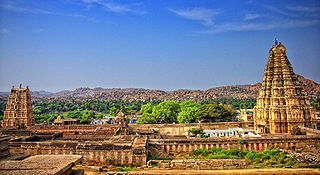
Hampi or Hampe, also referred to as the Group of Monuments at Hampi, is a UNESCO World Heritage Site located in Hampi (City), Ballari district now Vijayanagara district, east-central Karnataka, India. Hampi predates the Vijayanagara Empire; it is mentioned in the Ramayana and the Puranas of Hinduism as Pampa Devi Tirtha Kshetra. Hampi continues as a religious centre, with the Virupaksha Temple, an active Adi Shankara-linked monastery and various monuments belonging to the old city.

Pattadakal, also called Raktapura, is a complex of 7th and 8th century CE Hindu and Jain temples in northern Karnataka, India. Located on the west bank of the Malaprabha River in Bagalkot district, this UNESCO World Heritage Site is 23 kilometres (14 mi) from Badami and about 9.7 kilometres (6 mi) from Aihole, both of which are historically significant centres of Chalukya monuments. The monument is a protected site under Indian law and is managed by the Archaeological Survey of India (ASI).
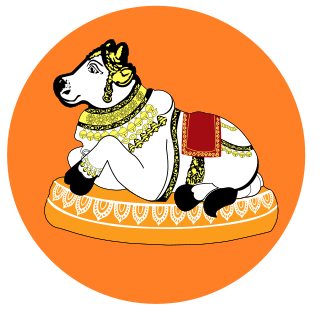
The Pancharama Kshetras or the Pancharamas are five ancient Hindu temples dedicated to the deity Shiva in Andhra Pradesh. According to regional legend, the lingams at these temples are made from a single lingam.

Ksheerarama is one of the five Pancharama Kshetras that are sacred to the Hindu god Shiva. The temple is located in Palakollu of West Godavari in the Indian state of Andhra Pradesh. Shiva is known locally as Ksheera Ramalingeswara Swamy. It is believed that staying one day in Kshirarama is equivalent to staying one year in Varanasi. It is one of the centrally protected monuments of national importance.

Kumararama or Bhimarama is one of the five Pancharama Kshetras that are sacred to the Hindu god Shiva. The temple is located in Samalkota of Kakinada district in the Indian state of Andhra Pradesh. The other four temples are Amararama at Amaravati(Dist. Guntur), Draksharama at Draksharama, Ksheerarama at Palakollu and Somarama at Bhimavaram(both in Dist. West Godavari). It is one of the centrally protected monuments of national importance.

The Pashupatinath Temple is a Hindu temple dedicated to Pashupati, a form of Shiva. It is located in Kathmandu, Nepal near the Bagmati River. The temple was classified as a World Heritage Site in 1979. This "extensive Hindu temple precinct" is a "sprawling collection of temples, ashrams, images and inscriptions raised over the centuries along the banks of the sacred Bagmati river", and is one of seven monument groups in UNESCO's designation of Kathmandu Valley. The temple, considered one of the holiest pilgrimage sites for Hindus, is built on an area of 246 hectares and includes 518 mini-temples and a main pagoda house.

Veerabhadra temple is a Hindu temple located in the Lepakshi, in the state of Andhra Pradesh, India. The temple is dedicated to the Virabhadra, a fierce form of the god Shiva.
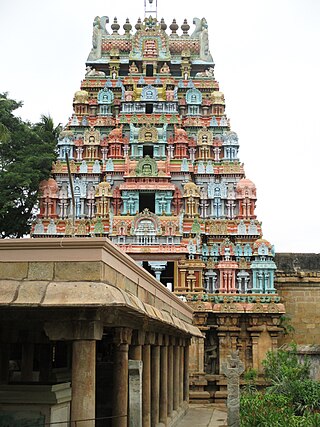
Jambukeswarar Temple, Thiruvanaikaval is a temple of Shiva in Tiruchirapalli district, in the state of Tamil Nadu, India. It is one of the five major Shiva Temples of Tamil Nadu representing the Mahābhūta or five elements; this temple represents the element of water, or neer in Tamil. The sanctum of Jambukeswara has an underground stream.

Kotipalli also known as Koti Theertham is a village located in K. Gangavaram mandal of Ramachandrapuram revenue division in Konaseema district of Andhra Pradesh, India. The temple town is also known as Kumararama of the Pancharama Kshetras, and is located 15 km from Amalapuram. Every year festivals such as Maha Sivaratri, Vaisakha Suddha Ekadasi, Aswayuja Suddha Padyami to Dwadasi and Ksheerabdi Dwadasi Teppotsavam are celebrated in this village.

Kumara Swamy Devasthana, also known as Sri Kumaraswaami Temple, is a Hindu temple located in Hanumanthanagar, in the city of Bangalore, Karnataka, southern India. It is dedicated to the god Kartikeya, also known as Subrahmanya, Kumara Swamy, or Murugan.

The Shree Vajreshwari Yogini Devi Mandir is a Hindu temple dedicated to the goddess Vajreshwari, located in the town Vajreshwari, 75 km away from Mumbai. The town, earlier known as Vadvali, was renamed Vajreshwari in honour of the presiding deity of the temple.

The Vaikom Sree Mahadeva Temple is a temple dedicated to the Hindu god Shiva in Vaikom, Kottayam, Kerala, India.

Trikkur Mahadeva Temple is a rock-cut cave temple in Trikkur village in Thrissur District in Kerala believed to have been built in the 7th or 8th century. Being a cave temple, Buddhist and Jain monks used the site to meditate alongside the Hindu monks. It is a protected monument under the Department of Archaeology, Govt of Kerala since 1966. The temple and its premises are now owned by Paliyam Trust which is managed by Kshetra Samrakshana Samiti.

Bhoramdeo Temple is a Hindu temples dedicated to the god Shiva in Bhoramdeo, in the Indian state of Chhattisgarh. It comprises a group of four temples of which the earliest is a brick-temple. The main temple is the Bhoramdeo temple built in stone. The architectural features with erotic sculptures has given a distinct style akin to the Khajuraho temple and the Konark Sun Temple in Odisha, and hence the Bhoramdeo complex is known by the sobriquet the "Khajuraho of Chhattisgarh".
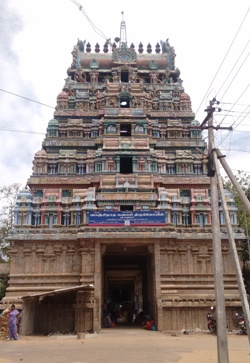
Vanchinadha Swamy temple is a Hindu temple dedicated to the deity Shiva, located in Srivanchiyam, Tiruvarur District, Tamil Nadu, India. Shiva is worshiped as Vanchinadha Swamy, and is represented by the lingam. His consort Parvati is depicted as Mangalambigai Amman. The presiding deity is revered in the 7th century Tamil Saiva canonical work, the Tevaram, written by Tamil saint poets known as the Nayanmars and classified as Paadal Petra Sthalam.

Nadutariappar Temple, Kanrappur is a Hindu temple dedicated to Shiva located at Kanrappur near Tiruvarur, Tamil Nadu, India. The temple is incarnated by the hymns of Appar and is classified as Paadal Petra Sthalam.
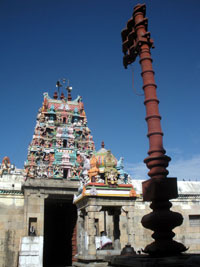
Kannayariamudayar Temple, Thirukkarayil is a Hindu temple dedicated to Shiva located in Thirukaravasal in Nagapattinam district of Tamil Nadu, India. Constructed in the Dravidian style of architecture, the temple is believed to have been built during the Cholas period in the 9th century. Shiva is worshipped as Kannayiranathar and his consort Parvathi as Kailasanayaki.

The Duladeo Temple is a Hindu temple in Khajuraho, Madhya Pradesh, India. The temple is dedicated to the god Shiva in the form of a linga, which is deified in the sanctum. 'Dulodeo' means "Holy Bridegroom". The temple is also known as "Kunwar Math". The temple faces east and is dated to 1000–1150 AD. It is the last of the temples built during the Chandela period. The temple is laid in the seven chariot plan (saptarata). The figurines carved in the temple have soft expressive features unlike other temples. The walls have a display of carved celestial dancers (apsara) in erotic postures and other figures. As part of the Khajuraho Group of Monuments, the temple was inscribed on the UNESCO World Heritage List in 1986.
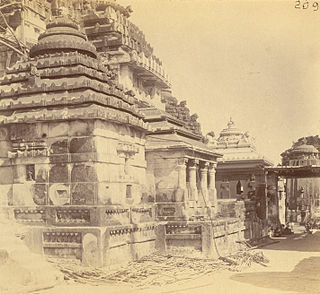
The Vimala Temple or Bimala Temple is a Hindu temple dedicated to goddess Vimala or Bimala (ବିମଳା), located within the Jagannath Temple complex in Puri in the Indian state of Odisha. It is generally regarded as a Shakta pitha, among the holiest temples dedicated to the Hindu Goddess.

The Varahanatha Temple, also known as Yajna Varaha Temple, is a Hindu temple complex, located on the left bank of the Vaitarani River on an island formed by the river, in Jajpur, Odisha, India. The main shrine is dedicated to Varaha, the boar avatar of the god Vishnu. Built in 15-16th century, the temple is constructed in Kalinga architectural style. Besides the central Varaha shrine, there are numerous subordinate shrines to deities like Shiva, Vishnu, Vimala and others.



























